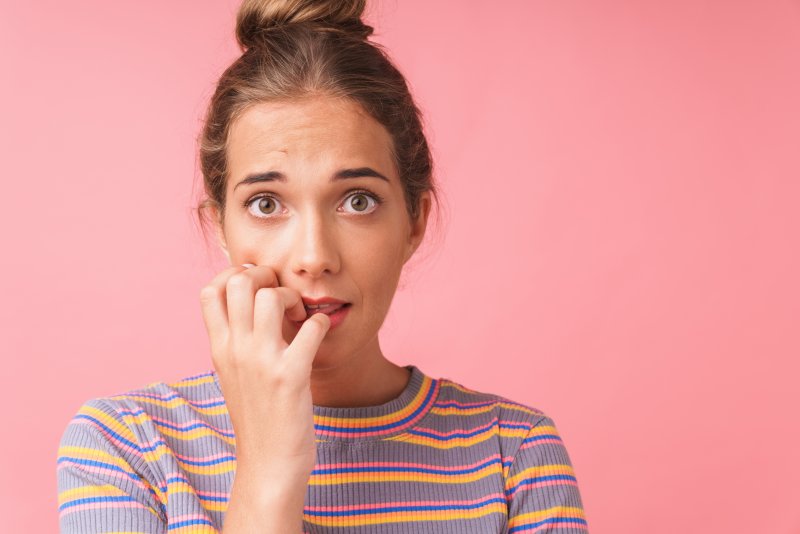
Nail biting is one of those habits that forms early and may never leave. There are many reasons you might have begun to bite your nails—nervousness, anxiety, boredom, or depression, but in all cases, it is a habit that only leads to more problems, problems that your dentist will have to fix.
So, what does nail biting do to your teeth, and how can you stop the habit? Continue reading to learn about four potential outcomes and some tips to help you drop the habit once and for all.
Bruxism
Bruxism is a medical term that describes an unconscious grinding of your teeth. Nail biting is a nervous habit that can lead to other nervous habits such as bruxism. The constant grinding of your teeth can cause damage to the enamel of your teeth, facial pain, and tooth sensitivity.
Chips and Fractures
If you bite your nails regularly, you increase your risk for a chipped or fractured tooth. Your teeth are strong and have a hard coating of enamel over them, but this does not make them indestructible.
The edges of your teeth can be worn down over time before eventually cracking, or chipping.
This can be a slow process, but once it happens the only way to fix it is to see your dentist. If bacteria finds its way into one of these cracks in your tooth, it can lead to tooth decay.
Dirt and Bacteria
Speaking of bacteria, your fingernails will often have dirt, skin, or other particles underneath them. When you bite your nails, all the germs carried by those particles can enter your mouth and change your oral biome.
Not only can this introduction of bacteria lead to tooth decay as mentioned above, but it could also spread germs from other parts of your body and cause other complications like fever blisters or gingivitis.
Malocclusion
Biting your nails could have another unintending consequence—tooth shifting. As your teeth shift, you may develop a malocclusion.
This is when your upper and lower teeth don’t come together normally, which can lead to damaged teeth, trouble speaking, or trouble chewing and swallowing.
So, What Can I Do?
By now you can see that biting your nails not only is a bad habit but can lead to some serious complications if it continues unaddressed. Here are some practical tips on how to decrease or eliminate the habit altogether.
- Cut your nails short — You can’t bite them if they’re not there.
- Coat your nails with polish or other product — The bitterness of some coatings is made to deter chewing.
- Make another habit — Squeeze a stress ball or massage your hands instead.
All these things will lead not only to less nail-biting, but also to better habits, and happier teeth (and fingers.) The first step to breaking any habit is to acknowledge it’s a habit you want to break, and then take steps to refrain from the habit in the future.
About the Author
Dr. Erin Prach is a passionate and professional dentist who is active in both the American Dental Association as well as the Wyoming Dental Association. She is the happiest when her patients are confident with their smiles. If you or a family member needs preventative or reconstructive dentistry, call (307) 337-4770, or visit the website here to learn more.
